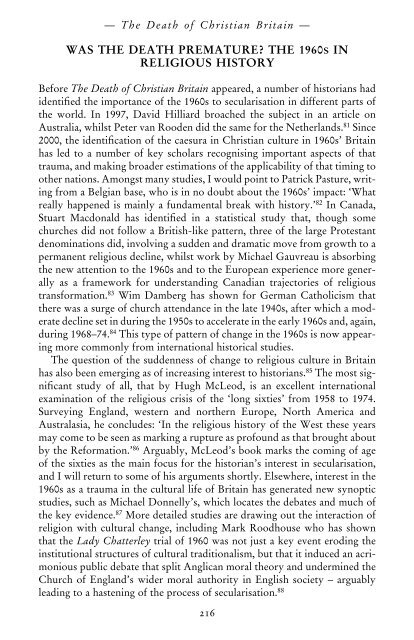The Death of Christian Britain
The Death of Christian Britain
The Death of Christian Britain
You also want an ePaper? Increase the reach of your titles
YUMPU automatically turns print PDFs into web optimized ePapers that Google loves.
— <strong>The</strong> <strong>Death</strong> <strong>of</strong> <strong>Christian</strong> <strong>Britain</strong> —<br />
WAS THE DEATH PREMATURE? THE 1960S IN<br />
RELIGIOUS HISTORY<br />
Before <strong>The</strong> <strong>Death</strong> <strong>of</strong> <strong>Christian</strong> <strong>Britain</strong> appeared, a number <strong>of</strong> historians had<br />
identified the importance <strong>of</strong> the 1960s to secularisation in different parts <strong>of</strong><br />
the world. In 1997, David Hilliard broached the subject in an article on<br />
Australia, whilst Peter van Rooden did the same for the Netherlands. 81 Since<br />
2000, the identification <strong>of</strong> the caesura in <strong>Christian</strong> culture in 1960s’ <strong>Britain</strong><br />
has led to a number <strong>of</strong> key scholars recognising important aspects <strong>of</strong> that<br />
trauma, and making broader estimations <strong>of</strong> the applicability <strong>of</strong> that timing to<br />
other nations. Amongst many studies, I would point to Patrick Pasture, writing<br />
from a Belgian base, who is in no doubt about the 1960s’ impact: ‘What<br />
really happened is mainly a fundamental break with history.’ 82 In Canada,<br />
Stuart Macdonald has identified in a statistical study that, though some<br />
churches did not follow a British-like pattern, three <strong>of</strong> the large Protestant<br />
denominations did, involving a sudden and dramatic move from growth to a<br />
permanent religious decline, whilst work by Michael Gauvreau is absorbing<br />
the new attention to the 1960s and to the European experience more generally<br />
as a framework for understanding Canadian trajectories <strong>of</strong> religious<br />
transformation. 83 Wim Damberg has shown for German Catholicism that<br />
there was a surge <strong>of</strong> church attendance in the late 1940s, after which a moderate<br />
decline set in during the 1950s to accelerate in the early 1960s and, again,<br />
during 1968–74. 84 This type <strong>of</strong> pattern <strong>of</strong> change in the 1960s is now appearing<br />
more commonly from international historical studies.<br />
<strong>The</strong> question <strong>of</strong> the suddenness <strong>of</strong> change to religious culture in <strong>Britain</strong><br />
has also been emerging as <strong>of</strong> increasing interest to historians. 85 <strong>The</strong> most significant<br />
study <strong>of</strong> all, that by Hugh McLeod, is an excellent international<br />
examination <strong>of</strong> the religious crisis <strong>of</strong> the ‘long sixties’ from 1958 to 1974.<br />
Surveying England, western and northern Europe, North America and<br />
Australasia, he concludes: ‘In the religious history <strong>of</strong> the West these years<br />
may come to be seen as marking a rupture as pr<strong>of</strong>ound as that brought about<br />
by the Reformation.’ 86 Arguably, McLeod’s book marks the coming <strong>of</strong> age<br />
<strong>of</strong> the sixties as the main focus for the historian’s interest in secularisation,<br />
and I will return to some <strong>of</strong> his arguments shortly. Elsewhere, interest in the<br />
1960s as a trauma in the cultural life <strong>of</strong> <strong>Britain</strong> has generated new synoptic<br />
studies, such as Michael Donnelly’s, which locates the debates and much <strong>of</strong><br />
the key evidence. 87 More detailed studies are drawing out the interaction <strong>of</strong><br />
religion with cultural change, including Mark Roodhouse who has shown<br />
that the Lady Chatterley trial <strong>of</strong> 1960 was not just a key event eroding the<br />
institutional structures <strong>of</strong> cultural traditionalism, but that it induced an acrimonious<br />
public debate that split Anglican moral theory and undermined the<br />
Church <strong>of</strong> England’s wider moral authority in English society – arguably<br />
leading to a hastening <strong>of</strong> the process <strong>of</strong> secularisation. 88<br />
216








